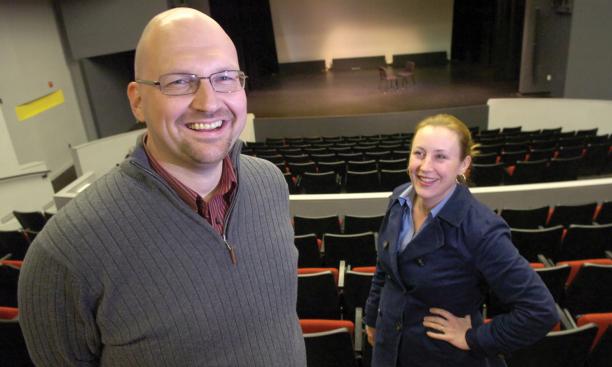

Most people remember the Greek myth of the Minotaur as the heroic tale of brave Theseus slaying the half-man, half-bull who roamed the labyrinth of Crete. A new production scheduled to run through Aug. 16 at San Francisco’s Cutting Ball Theater explores a different side of the story. The one-woman play, Bone to Pick,directed by Rob Melrose ’92 and performed by Paige Rogers ’89, focuses on Ariadne, the princess of Crete who betrays her father to help Theseus. On their voyage back to Athens, however, the young hero reneges on his promise to marry the girl and instead abandons her on a deserted island. Bone to Pick, a new play commissioned by Cutting Ball, imagines Ariadne languishing there 3,000 years later. “At its core, it explores women’s power and the transgressions that they commit and get coerced into committing,” says Melrose, who with Rogers, his wife, founded Cutting Ball in 1999.
Cutting Ball has developed a reputation for squeezing something new out of the classics. Named for a cutpurse who ran with Shakespeare’s crowd, the company has garnered kudos for the way it reinterprets plays like The Taming of the Shrew,No Exit, and Endgame. “Cutting Ball makes perennials seem as if they were written yesterday,” said San Francisco magazine last year, when it included the company in its annual “Best of San Francisco” issue. “Melrose has a talent for mining classics for hidden themes and bringing musty old texts to life,” said theSan Francisco Weekly in its own “Best Of” list in 2006.
Melrose, the company’s artistic director, and Rogers, a company actor and associate artistic director, met at Princeton, where they both majored in English and received certificates in Theater and Dance. They married in 1993. A year-long grant to study Shakespeare productions in Europe in 1997 planted the seed for Melrose’s subsequent interpretations. European companies re-translate Shakespeare once every decade, to keep the language current. From that practice, Melrose learned to comb methodically through texts, searching each word, phrase, and scene for every possible meaning. The approach has led to intriguing departures, like a Taming of the Shrew that is more about identity than subjugation and a Macbeth that portrays the ruthless Lady Macbeth as a grief-stricken mother distraught over the loss of a child.
Melrose has directed at the Guthrie Theater and the Actors Collective and this year was assistant director of New York’s Shakespeare in the Park production ofHamlet that ran through June 29. “Due to media, due to Game Boys, due to technology and the world as it is today, theater is not what it used to be,” says Rogers. “Rob has an idea about where the form might be in 100 years. I think he’s going to be looked at as one of those people who saw the future a little bit and led other people on the path to it.”
